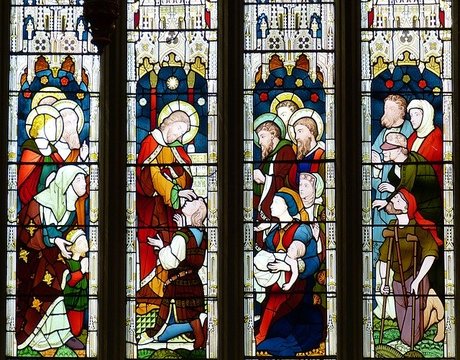Divine Retreat Centre UK – Official Website

Dangers of Modern-Day Gossiping
August 17, 2020
How to Celebrate the Holy Eucharist Meaningfully?
August 19, 2020Healings happen and are heard about all the time but many have probably wondered why some receive healing and not others. Does God have favourites? Am I not praying hard enough? Maybe you have attended many retreats, attended regular Holy Mass and consider yourself to be very devoted and dedicated, but you still have not received the healing that you have been praying for, for so long. This article will answer this very common question by looking at the twelve disciples and the four types of sufferings.

Authority given to the twelve disciples
From the gospel of Matthew 10:1, “Then Jesus summoned his twelve disciples and gave them authority over unclean spirits, to cast them out, and to cure every disease and every sickness” , we see that Jesus gave the twelve disciples authority to drive out evil spirits and heal all sicknesses and diseases. Christianity is the only religion where God gives such authority; no other religion gives this as no other god has this same power. Jesus, since He is God in human form, had all the powers in heaven and earth and so can give us this authority that the Father has given Him. John 20:21-23, Jesus said to them again, “Peace be with you. As the Father has sent me, so I send you.” When he had said this, he breathed on them and said to them, “Receive the Holy Spirit. If you forgive the sins of any, they are forgiven them; if you retain the sins of any, they are retained.”
During their lifetime, the disciples performed many miracles through the authority given to them. However, if we look into their lives, we can see that the same healings and miracles they performed to others, through Christ, were not received by them. The disciples went through a tremendous amount of suffering, were imprisoned and killed. Even St Paul experienced many shipwrecks. He was bitten by a snake and although was healed after, God did not prevent him from being bitten. St Theresa Lisieux suffered from TB and died from it, along with many other saints who died from different other illnesses. These were people who were very devoted to the work of God, yet they did not receive healing. Why? Well firstly, God does not show partiality to anyone. Secondly, as mentioned before, there are four types of sufferings that can be used to explain this.
Before we dive into the types of sufferings, we must understand that there were two types of disciples: inner circle and outer circle. The inner circle disciples, the twelve disciples, went through suffering, rejection, martyrdom and are now saints and apostles. However there were some disciples, the outer circle disciples, who followed Jesus from a distance. They received healings and miracles, such as those who were present at the feeding of the five thousand, but afterwards we do not see them in the picture. Most turned away from Jesus when he was on the cross as their faith was not so strong.
God wants us all to be close to Him but many times we have a tendency to stay distant from God thinking that if we do then this will prevent suffering and pain. However it is through pain and suffering that we enter into the unity with God. Without Good Friday there is no Easter.
The four types of sufferings
The first type of suffering is the suffering that God heals.
This is done for the glory of God. In John 9:2-3 “His disciples asked him, “Rabbi, who sinned, this man or his parents, that he was born blind?” Jesus answered, “Neither this man nor his parents sinned; he was born blind so that God’s works might be revealed in him.” , we see that there are some who suffer from sicknesses and diseases not due to committing sin but God permits these sicknesses so that His glory may be revealed in them through their healing. God wants to heal them not for their personal benefit but so that He will be glorified. It is therefore important that we do not hide any healings we receive but share it with the world to glorify God!
The second type of suffering is where there is no healing due to sin.
In Isaiah 59:1-2 “See, the Lord’s hand is not too short to save, nor his ear too dull to hear. Rather, your iniquities have been barriers between you and your God, and your sins have hidden his face from you so that he does not hear” , we see that in most cases, God wants to heal us but this blessing is blocked due to sin. Although we may pray a lot, attend many masses, we may still be carrying hatred in our heart. We may be pondering, planning sins; we may be hurting others by our words and actions. It is not that God is far from us but that we ourselves stand in the way of God’s blessing. Many times we look for other things or people to blame when in reality, we are the biggest block to God’s blessings. Therefore, we must examine, confess and repent.
The third type of suffering is the suffering that permitted for our purification
It may be that there is no sin and that we are very devoted to God, but the suffering is present in order to purify us. God, being the loving Father He is permitting suffering to discipline us. Hebrews 12:7, “Endure trials for the sake of discipline. God is treating you as children; for what child is there whom a parent does not discipline?” . The same way our earthly parents discipline us, because of the love that they have for us, God also disciplines us through our suffering because He loves us. God therefore allows us to fall into problems so that He can teach us to come out of it. He allows people to attack, accuse and hurt us in order to teach us how to face such actions- all of which helps us in our purification. So, allow God to discipline you and know that He does this because you are His child. If we surrender and thank God for our sufferings, our inner nature will be renewed day by day. 2 Corinthians 4:16-17, “So we do not lose heart. Even though our outer nature is wasting away, our inner nature is being renewed day by day. 17 For this slight momentary affliction is preparing us for an eternal weight of glory beyond all measure, 18 because we look not at what can be seen but at what cannot be seen; for what can be seen is temporary, but what cannot be seen is eternal.”. So, rejoice in your sufferings, for God wants to produce endurance so that one day you will lack nothing. James 1:2-4, “My brothers and sisters, whenever you face trials of any kind, consider it nothing but joy,because you know that the testing of your faith produces endurance; and let endurance have its full effect, so that you may be mature and complete, lacking in nothing.” And remember, though there is suffering, God never hides His face from us. Isaiah 30:20, “Though the Lord may give you the bread of adversity and the water of affliction, yet your Teacher will not hide himself any more, but your eyes shall see your Teacher.”
The fourth type of suffering is the suffering that is permitted for the purification of others, which is a calling only for some.
As we are united to Christ, suffering is permitted so that through our suffering, we are able to purify others in the same way Jesus purified humanity through His suffering . 1 Peter 2:20-21, “If you endure when you are beaten for doing wrong, what credit is that? But if you endure when you do right and suffer for it, you have God’s approval. 21 For to this you have been called, because Christ also suffered for you, leaving you an example, so that you should follow in his steps”. Being close to Jesus means that we also want to purify and help others in the same way Jesus did. We go through pain, not because God is unable or that our prayers are not being heard, but because we are going through the pain of childbirth until Christ is formed in us. Galatians 4:19, My little children, for whom I am again in the pain of childbirth until Christ is formed in you.
So yes, some receive healing and some do not. This is not because God has favourites or that we are not praying enough or that God does not hear us. Suffering exists either due to our own blockings, to glorify God or to purify ourselves and others so that Christ will be formed in us.
Related Scripture: 1 Peter 4:12, Hebrews 12:5-8, Acts 14:22, Philippians 1:6, 1 Peter 1:6-7
To watch the full video, please click: https://youtu.be/vfdumyenk5s




